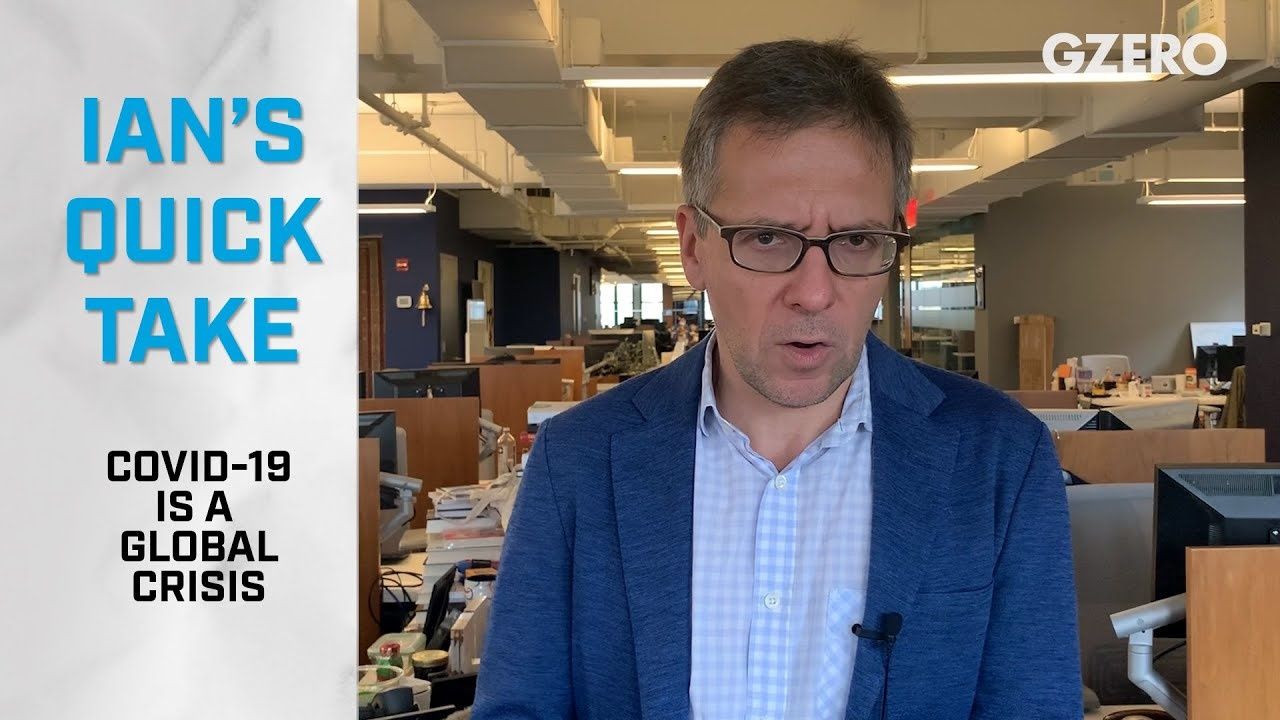popular
Ian Bremmer: COVID-19 Is A Global Crisis

Ian Bremmer: COVID-19 Is A Global Crisis | Analysis: no global leader; longer crisis | GZERO Media

The lack of international political response, the politicization of the crisis, leads to less efficiency, to longer shutdowns, and extensive economic impact.
In the US: governors and mayors are doing different things. If decisions on what is or is not an essential good differ from state to state, it's hard to put together a supply chain for goods produced across states. The implications are larger. You can shut down all of California, but if you don't have control over the state borders (and you don't), people can move. What happens when you try to restart, & there are outbreaks in other states?
This is not a national crisis. It affects the entire world. We've not seen a crisis to this extent in our lifetimes. The 2008 financial crisis was a piece of the economy that racked global markets, but didn't impact every sector in the global economy. This is affecting the supply chain and global consumption. It's stopping people from traveling, from engaging in livelihoods.
If you want to respond to a global crisis, you need a global response. If you have cancer and you see an ophthalmologist who says, "I know how I can fix your eyes," - the cancer is still spreading. You've got to focus holistically, and we don't have a holistic response globally.
We have a lot of finger-pointing between the United States and China. President Trump sees that if we blame the Chinese, we can be on a war footing. Fighting an invisible war against the "Chinese virus". That's a way to improve Trump's approval ratings. Being on a war footing domestically usually leads to an improvement in popularity. We see that in South Korea, where they've been pretty effective, but also in France and Italy, where they're experiencing disaster economically. But the popularity of the governments has been going up - patriotic response, "we're at war." You can't win a war against terror, but you can win a war against coronavirus. You can find a vaccine. You can get rid of it, even at vast personal costs. That's why Trump is doing it. But - it needs to be a global war because it is a global pandemic and there is no global leader. We don't have global soldiers. There's no global arsenal to fight a global pandemic. The likelihood that this continues to spread gets higher.
This conversation about extending the curve, makes sense, because you want to ensure that health care systems are not overwhelmed, you need time to build them up so that the people racing to ICUs because they desperately need it, aren't turned away - that would lead to people with critical care needs untreated. But if they're not globally connected, then the likelihood that one country is successful, but cases pop up; we're now seeing that South Korea, Singapore, and Taiwan are seeing larger numbers of cases again. I have no doubt they will respond effectively, but secondary outbreaks are coming in large part because the rest of the world isn't coordinated.
As the weather gets warmer in our part of the world, New York, the northern hemisphere, in sub-Saharan Africa, and South America, it's much more likely that you're going to have new breakouts. Those breakouts will be larger without international coordination. We are a year minimum away from functional vaccines. We're much closer to that to the ability to, at scale, treat people that have coronavirus. But reducing some of the effects of coronavirus is not healing it. If we had something that responded well to flu, we'd be giving it to people with flu. We don't.
And so, the early stage, medicines being talked about, including at press briefings by President Trump, may have some success for people that have already already gotten the virus. But that's very different from saying that this is somehow going to change. So, I do think that we're now looking at a shut down in the United States, not just for a matter of weeks, but for months. You're going to see that in Europe and the potential that hitting the southern hemisphere is growing.
The human spirit is indomitable. I have no doubt we will eventually get a vaccine. But this is going to be a very trying time, made much more trying by the fact that the politics are so inefficient & so misaligned. I wish I could say it was just about the US election. It's not. It's a global and structural issue.
For many in Iran, it’s a waiting game for how long Ayatollah Khamenei has left to live.
In a 30-minute call on Thursday, President Donald Trump reportedly told Ukrainian President Volodymyr Zelensky he wants to end the war with Russia as soon as possible — aiming for a deal by summer, but ideally within weeks.
Former British ambassador to the U.S. Peter Mandelson leaves his residence after he was released following his arrest by London police on Monday on suspicion of misconduct in public office, following the release of U.S. Justice Department files linked to the late financier and convicted sex offender Jeffrey Epstein, in London, Britain, February 26, 2026.
The ghost of Jeffrey Epstein continues to haunt the world.
Think you know what's going on around the world? Here's your chance to prove it.